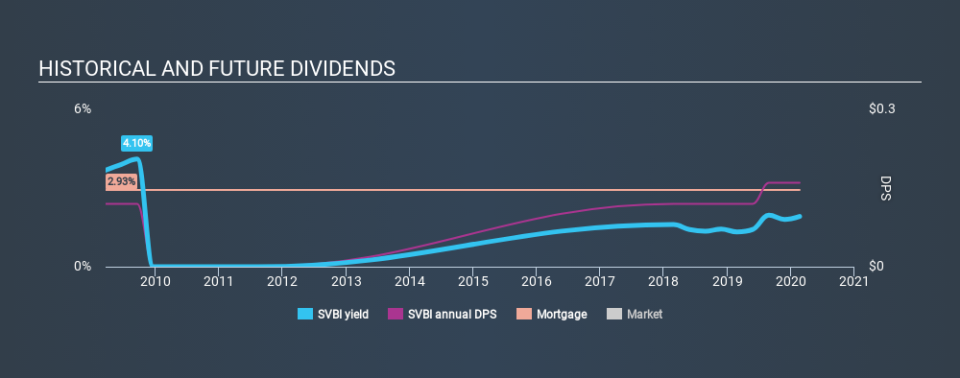Severn Bancorp, Inc. (NASDAQ:SVBI) Vies For A Place In Your Dividend Portfolio: Here's Why

Is Severn Bancorp, Inc. (NASDAQ:SVBI) a good dividend stock? How can we tell? Dividend paying companies with growing earnings can be highly rewarding in the long term. On the other hand, investors have been known to buy a stock because of its yield, and then lose money if the company's dividend doesn't live up to expectations.
While Severn Bancorp's 1.9% dividend yield is not the highest, we think its lengthy payment history is quite interesting. Before you buy any stock for its dividend however, you should always remember Warren Buffett's two rules: 1) Don't lose money, and 2) Remember rule #1. We'll run through some checks below to help with this.
Explore this interactive chart for our latest analysis on Severn Bancorp!
Payout ratios
Companies (usually) pay dividends out of their earnings. If a company is paying more than it earns, the dividend might have to be cut. Comparing dividend payments to a company's net profit after tax is a simple way of reality-checking whether a dividend is sustainable. Looking at the data, we can see that 21% of Severn Bancorp's profits were paid out as dividends in the last 12 months. With a low payout ratio, it looks like the dividend is comprehensively covered by earnings.
Remember, you can always get a snapshot of Severn Bancorp's latest financial position, by checking our visualisation of its financial health.
Dividend Volatility
Before buying a stock for its income, we want to see if the dividends have been stable in the past, and if the company has a track record of maintaining its dividend. Severn Bancorp has been paying dividends for a long time, but for the purpose of this analysis, we only examine the past 10 years of payments. Its dividend payments have declined on at least one occasion over the past ten years. During the past ten-year period, the first annual payment was US$0.12 in 2010, compared to US$0.16 last year. This works out to be a compound annual growth rate (CAGR) of approximately 2.9% a year over that time. The dividends haven't grown at precisely 2.9% every year, but this is a useful way to average out the historical rate of growth.
We're glad to see the dividend has risen, but with a limited rate of growth and fluctuations in the payments, we don't think this is an attractive combination.
Dividend Growth Potential
Given that the dividend has been cut in the past, we need to check if earnings are growing and if that might lead to stronger dividends in the future. It's good to see Severn Bancorp has been growing its earnings per share at 63% a year over the past five years. Earnings per share have grown rapidly, and the company is retaining a majority of its earnings. We think this is ideal from an investment perspective, if the company is able to reinvest these earnings effectively.
Conclusion
To summarise, shareholders should always check that Severn Bancorp's dividends are affordable, that its dividend payments are relatively stable, and that it has decent prospects for growing its earnings and dividend. We're glad to see Severn Bancorp has a low payout ratio, as this suggests earnings are being reinvested in the business. We were also glad to see it growing earnings, but it was concerning to see the dividend has been cut at least once in the past. Severn Bancorp has a number of positive attributes, but falls short of our ideal dividend company. It may be worth a look at the right price, though.
Are management backing themselves to deliver performance? Check their shareholdings in Severn Bancorp in our latest insider ownership analysis.
We have also put together a list of global stocks with a market capitalisation above $1bn and yielding more 3%.
If you spot an error that warrants correction, please contact the editor at editorial-team@simplywallst.com. This article by Simply Wall St is general in nature. It does not constitute a recommendation to buy or sell any stock, and does not take account of your objectives, or your financial situation. Simply Wall St has no position in the stocks mentioned.
We aim to bring you long-term focused research analysis driven by fundamental data. Note that our analysis may not factor in the latest price-sensitive company announcements or qualitative material. Thank you for reading.

